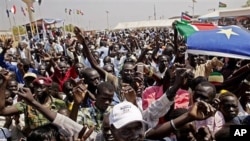The Southern Sudan Referendum Commission has released the results of January’s vote on southern independence.
Of the nearly four million Southern Sudanese that voted in the January referendum, more than 98 percent chose to secede from the north. Sunday in Juba, officials from the referendum commission announced the results to a crowd of southern officials and residents who waited hours in the heat to hear the results.
According to the commission’s deputy chairman, Chan Reec Madut, voters living in Southern Sudan were nearly unanimous in their desire for independence.
"Those who voted for separation in Southern Sudan were 3,697,467. And the percentage is 99.57 percent," said Madut.
Watch Scott Bobb's Companion TV Report
The vote took place from January 9 until the 15 in Northern and Southern Sudan, and eight other countries where many southerners who fled the civil war live. The referendum was the centerpiece of a 2005 peace deal known as the CPA that ended decades of civil war between the mostly Muslim and Arab north and the mostly Christian and animist south.
Many southerners and foreign observers had their doubts the vote would ever take place. But according to Madut, southerners would not have accepted a cancellation of the vote on independence.
"The entire CPA is meaningless without the right of self-determination," said Madut.
Final results will be released by February 14, though they may be available sooner if there are no legal objections. After final results are released, southerners will look to northern President Omar Al Bashir to recognize the results. The African Union announced earlier in the week that they will be the first to recognize Africa’s newest state.
In the north, only 57 percent of voters chose separation. Much remains unclear about their future once the south officially separates in July. Their citizenship status has not been decided.
President Bashir has said that there will be a much stricter version of sharia law in the north once the south departs.
But according to Referendum Commission Chairman Mohamed Ibrahim Khalil the north and the south will remain closely linked after secession because of geographic and historic bonds. "These indissoluble bonds will not dissipate, will not disappear," he said.
The south’s official independence day is scheduled for July 9, 2011. Negotiations between north and south have started again, with border demarcation, oil-wealth sharing, debt obligations and the future of the border region Abyei still to be worked out. After official results are announced, leaders in the south will meet to start writing a constitution and decide many of the remaining issues, like what to name the new country and when to hold its first elections.




